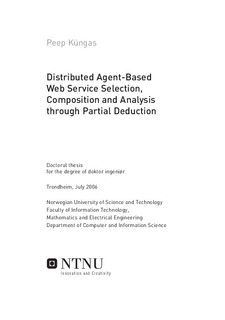| dc.contributor.author | Küngas, Peep | nb_NO |
| dc.date.accessioned | 2014-12-19T13:30:08Z | |
| dc.date.available | 2014-12-19T13:30:08Z | |
| dc.date.created | 2008-01-09 | nb_NO |
| dc.date.issued | 2006 | nb_NO |
| dc.identifier | 123187 | nb_NO |
| dc.identifier.isbn | 82-471-7781-1 | nb_NO |
| dc.identifier.uri | http://hdl.handle.net/11250/249878 | |
| dc.description.abstract | In order to facilitate agile business and support online partnership formation, many modern information systems are designed to support interoperability. This tendency has become mainstream with advancements in distributed systems and is supported by the Internet and industrial standards (or standard proposals) like XML, WSDL, SOAP and BPEL. However, increasing complexity of distributed information systems puts forward requirements to high adaptivity of distributed information systems.
Alternative technologies have been proposed in academia for supporting adaptivity in information systems. These technologies include cooperative problem solving, agent technology, Web service composition, the Semantic Web and P2P networks. Despite the high potential of such technologies, only few efforts have been made to integrate them into commercial applications.
The main aim of this thesis is to investigate and determine to what extent automated Web service composition can be applied in practice. We have implemented a tool, which exploits symbolic negotiation for distributed Web service composition. While applying our approach to automated Web service composition we demonstrate that automated composition methods are useful for analysing Web service domains. More specifically, potential interactions and synergy between different Web services’ domains can be discovered by using automated composition.
The main contributions of the thesis are the following. First, it formalises partial deduction for linear logic. Also soundness and completeness of the formalism is proved. Second, it formalises symbolic negotiation with respect to partial deduction and identifies relations between cooperative problem solving and symbolic negotiation. Third, a multi-agent system, utilising the developed formal methods, is designed and implemented. Moreover, the multi-agent system is extended with P2P capabilities. Fourth, a distributedWeb service composition tool is described and implemented. Finally, automatedWeb service composition is evaluated over a set of existing governmental and commercial Web services. | nb_NO |
| dc.language | eng | nb_NO |
| dc.publisher | Fakultet for informasjonsteknologi, matematikk og elektroteknikk | nb_NO |
| dc.relation.ispartofseries | Doktoravhandlinger ved NTNU, 1503-8181; 2006:21 | nb_NO |
| dc.title | Distributed Agent-Based Web Service Selection, Composition and Analysis through Partial Deduction | nb_NO |
| dc.type | Doctoral thesis | nb_NO |
| dc.contributor.department | Norges teknisk-naturvitenskapelige universitet, Fakultet for informasjonsteknologi, matematikk og elektroteknikk, Institutt for datateknikk og informasjonsvitenskap | nb_NO |
| dc.description.degree | dr.ing. | nb_NO |
| dc.description.degree | dr.ing. | en_GB |
